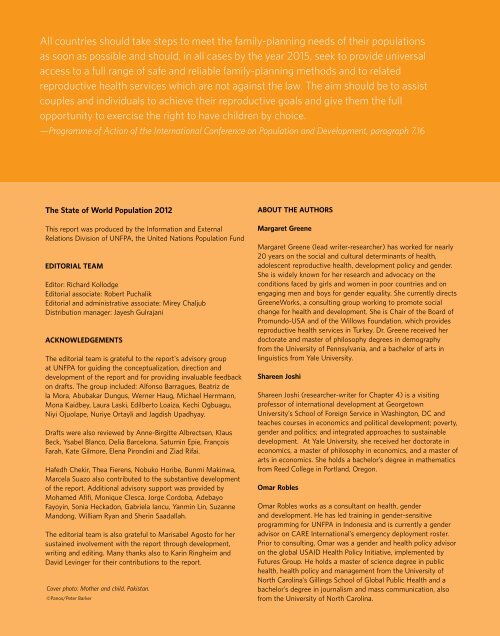State of World Population 2012 - Country Page List - UNFPA
State of World Population 2012 - Country Page List - UNFPA
State of World Population 2012 - Country Page List - UNFPA
You also want an ePaper? Increase the reach of your titles
YUMPU automatically turns print PDFs into web optimized ePapers that Google loves.
All countries should take steps to meet the family-planning needs <strong>of</strong> their populations<br />
as soon as possible and should, in all cases by the year 2015, seek to provide universal<br />
access to a full range <strong>of</strong> safe and reliable family-planning methods and to related<br />
reproductive health services which are not against the law. The aim should be to assist<br />
couples and individuals to achieve their reproductive goals and give them the full<br />
opportunity to exercise the right to have children by choice.<br />
—Programme <strong>of</strong> Action <strong>of</strong> the International Conference on <strong>Population</strong> and Development, paragraph 7.16<br />
The <strong>State</strong> <strong>of</strong> <strong>World</strong> <strong>Population</strong> <strong>2012</strong><br />
This report was produced by the Information and External<br />
Relations Division <strong>of</strong> <strong>UNFPA</strong>, the United Nations <strong>Population</strong> Fund<br />
Editorial team<br />
Editor: Richard Kollodge<br />
Editorial associate: Robert Puchalik<br />
Editorial and administrative associate: Mirey Chaljub<br />
Distribution manager: Jayesh Gulrajani<br />
Acknowledgements<br />
The editorial team is grateful to the report's advisory group<br />
at <strong>UNFPA</strong> for guiding the conceptualization, direction and<br />
development <strong>of</strong> the report and for providing invaluable feedback<br />
on drafts. The group included: Alfonso Barragues, Beatriz de<br />
la Mora, Abubakar Dungus, Werner Haug, Michael Herrmann,<br />
Mona Kaidbey, Laura Laski, Edilberto Loaiza, Kechi Ogbuagu,<br />
Niyi Ojuolape, Nuriye Ortayli and Jagdish Upadhyay.<br />
Drafts were also reviewed by Anne-Birgitte Albrectsen, Klaus<br />
Beck, Ysabel Blanco, Delia Barcelona, Saturnin Epie, François<br />
Farah, Kate Gilmore, Elena Pirondini and Ziad Rifai.<br />
Hafedh Chekir, Thea Fierens, Nobuko Horibe, Bunmi Makinwa,<br />
Marcela Suazo also contributed to the substantive development<br />
<strong>of</strong> the report. Additional advisory support was provided by<br />
Mohamed Afifi, Monique Clesca, Jorge Cordoba, Adebayo<br />
Fayoyin, Sonia Heckadon, Gabriela Iancu, Yanmin Lin, Suzanne<br />
Mandong, William Ryan and Sherin Saadallah.<br />
The editorial team is also grateful to Marisabel Agosto for her<br />
sustained involvement with the report through development,<br />
writing and editing. Many thanks also to Karin Ringheim and<br />
David Levinger for their contributions to the report.<br />
Cover photo: Mother and child, Pakistan.<br />
©Panos/Peter Barker<br />
About the authors<br />
Margaret Greene<br />
Margaret Greene (lead writer-researcher) has worked for nearly<br />
20 years on the social and cultural determinants <strong>of</strong> health,<br />
adolescent reproductive health, development policy and gender.<br />
She is widely known for her research and advocacy on the<br />
conditions faced by girls and women in poor countries and on<br />
engaging men and boys for gender equality. She currently directs<br />
GreeneWorks, a consulting group working to promote social<br />
change for health and development. She is Chair <strong>of</strong> the Board <strong>of</strong><br />
Promundo-USA and <strong>of</strong> the Willows Foundation, which provides<br />
reproductive health services in Turkey. Dr. Greene received her<br />
doctorate and master <strong>of</strong> philosophy degrees in demography<br />
from the University <strong>of</strong> Pennsylvania, and a bachelor <strong>of</strong> arts in<br />
linguistics from Yale University.<br />
Shareen Joshi<br />
Shareen Joshi (researcher-writer for Chapter 4) is a visiting<br />
pr<strong>of</strong>essor <strong>of</strong> international development at Georgetown<br />
University’s School <strong>of</strong> Foreign Service in Washington, DC and<br />
teaches courses in economics and political development; poverty,<br />
gender and politics; and integrated approaches to sustainable<br />
development. At Yale University, she received her doctorate in<br />
economics, a master <strong>of</strong> philosophy in economics, and a master <strong>of</strong><br />
arts in economics. She holds a bachelor’s degree in mathematics<br />
from Reed College in Portland, Oregon.<br />
Omar Robles<br />
Omar Robles works as a consultant on health, gender<br />
and development. He has led training in gender-sensitive<br />
programming for <strong>UNFPA</strong> in Indonesia and is currently a gender<br />
advisor on CARE International’s emergency deployment roster.<br />
Prior to consulting, Omar was a gender and health policy advisor<br />
on the global USAID Health Policy Initiative, implemented by<br />
Futures Group. He holds a master <strong>of</strong> science degree in public<br />
health, health policy and management from the University <strong>of</strong><br />
North Carolina’s Gillings School <strong>of</strong> Global Public Health and a<br />
bachelor’s degree in journalism and mass communication, also<br />
from the University <strong>of</strong> North Carolina.
















